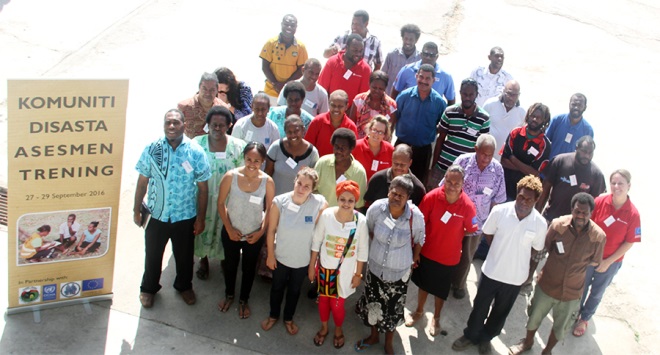Following TC Pam, NDMO recognised the need for enhanced community based disaster risk management responses. As such over the last year NDMO has been working with its key in country partners to review, revise and update certain processes and tools. One of those DRM processes and tools is the community based disaster assessment process. Community based disaster assessments are the first assessment undertaken following a disaster on the ground in Vanuatu and is envisaged to be completed where possible by trained community disaster committee (CDC) members supported by local and provincial government. This approach is to empower communities in achieving ownership and greater participation in the negative impacts of disasters that directly affect them.
Training CDC’s in the community assessment processes and its supporting tools has been ongoing during 2016 in targeted communities within Torba and Tafea Provinces as part of the Yumi Redi Consortium project.
Yumi Redi Consortium in conjunction with UNOCHA has been working in collaboration with NDMO to produce an updated first community assessment form to be undertaken at community level and develop a consolidation, analysis and reporting process of community based assessment data at provincial level.
The purpose of this 3 day training held between the 27-29 September 2016 was to launch the new NDMO first community assessment form and accompanying guidelines and inform key stakeholders of the revised community assessment process and build capacity of key provincial and national personnel to;
- Support communities, chiefs, area councils to undertake this process
- Understand roles and responsibilities in collecting, consolidating, analysing and reporting on community assessment information during times of disaster at community and provincial levels.
This 3 day national training was a collaborative effort between NDMO, Yumi Redi agencies - Save the Children, CARE International, Oxfam and French / Vanuatu Red Cross and UNOCHA.
Funded by Yumi Redi project donor the European Union Office for Humanitarian Affairs (ECHO) and UNOCHA.

